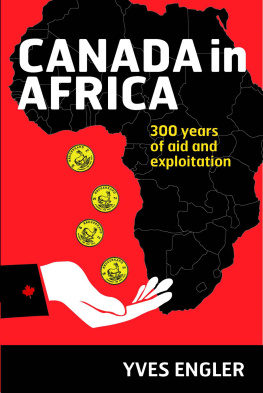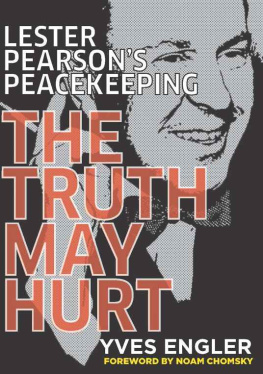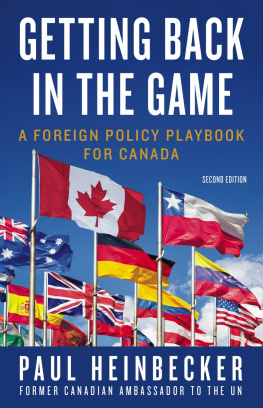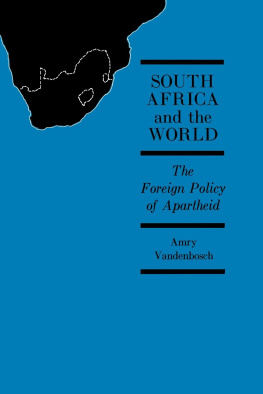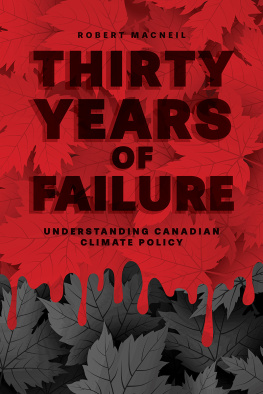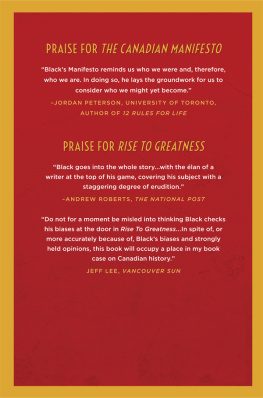Yves Engler - Canada in Africa: 300 Years of Aid and Exploitation
Here you can read online Yves Engler - Canada in Africa: 300 Years of Aid and Exploitation full text of the book (entire story) in english for free. Download pdf and epub, get meaning, cover and reviews about this ebook. year: 2015, publisher: Fernwood Publishing, genre: Politics. Description of the work, (preface) as well as reviews are available. Best literature library LitArk.com created for fans of good reading and offers a wide selection of genres:
Romance novel
Science fiction
Adventure
Detective
Science
History
Home and family
Prose
Art
Politics
Computer
Non-fiction
Religion
Business
Children
Humor
Choose a favorite category and find really read worthwhile books. Enjoy immersion in the world of imagination, feel the emotions of the characters or learn something new for yourself, make an fascinating discovery.
- Book:Canada in Africa: 300 Years of Aid and Exploitation
- Author:
- Publisher:Fernwood Publishing
- Genre:
- Year:2015
- Rating:5 / 5
- Favourites:Add to favourites
- Your mark:
Canada in Africa: 300 Years of Aid and Exploitation: summary, description and annotation
We offer to read an annotation, description, summary or preface (depends on what the author of the book "Canada in Africa: 300 Years of Aid and Exploitation" wrote himself). If you haven't found the necessary information about the book — write in the comments, we will try to find it.
Yves Engler continues his groundbreaking analyses of past and present Canadian foreign policy. The author of The Black Book of Canadian Foreign Policy, and other works that challenge the myth of Canadian benevolence, documents Canadian involvement in the transatlantic slave trade, the scramble for Africa and European colonialism. The book reveals Ottawa s opposition to anticolonial struggles, its support for apartheid South Africa and Idi Amin s coup, and its role in ousting independence leaders Patrice Lumumba and Kwame Nkrumah.
Based on an exhaustive look at the public record as well as on-the-ground research, Canada in Africa shows how the federal government pressed African countries to follow neoliberal economic prescriptions and sheds light on Canada s part in the violence that has engulfed Somalia, Rwanda and the Congo, as well as how Canada s indifference to climate change means a death sentence to ever-growing numbers of Africans.
One of the great myths of Canadian history is that the nation has only been helpful to Africa and persons of Black/African heritage, whether serving as a refuge for fugitive slaves in the 19th century or denouncing South African apartheid in the 20th. Yves Engler writes with majestic clarity and daunting command about the truths of Canada s relations to Africa and Africans, from the slavery conducted colonially, from Upper Canada to Nouvelle-France to Nova Scotia, to the pollution of lands and impoverishment of peoples wrought by Canuck mining interests in Africa today. Beware! This book is upsetting, for it argues with quite damning evidence that Canada has been as much an imperialist abuser of human rights as have the European (and American) empires we so righteously hypocritically condemn. Engler needs to be read by everyone who desires Truth in political science and Humanitarianism in contemporary foreign policy. George Elliott Clarke, Ph.D., E.J. Pratt Professor of Canadian Literature University of Toronto, Author of Directions Home: Approaches to African-Canadian Literature.
Canada in Africa reminds us that the draining of African blood through slavery and naked imperialism continues today through the draining of her resources. Yves Engler gives us a haunting chronicle of the bloodletting, destabilization and pillaging of Africa by agents and governments of Canada. This should be required reading for every human with a conscience and all those that desire to join the forces fighting for change. Nnimmo Bassey, winner of the Right Livelihood Award ( Alternative Nobel Prize ) and author of To Cook a Continent: Destructive Extraction and the Climate Crisis in Africa.
Yves Engler: author's other books
Who wrote Canada in Africa: 300 Years of Aid and Exploitation? Find out the surname, the name of the author of the book and a list of all author's works by series.

